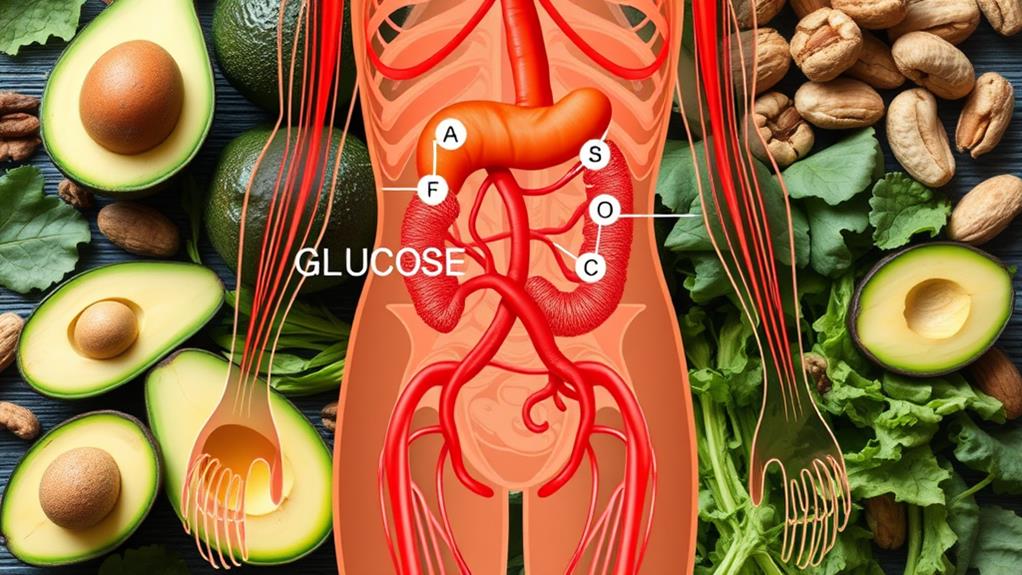
Ever wondered why everyone's talking about the keto diet? It's like magic but with science! When you eat way fewer carbs, your body enters ketosis, burning fat for energy instead of glucose. Your liver creates cool-sounding ketone bodies from fats, turning you into a fat-burning machine! This diet is super high in fats (think avocados and nuts), moderate in protein, and super low in carbs. Originally designed to help kids with epilepsy, it's now a hit for weight loss and maybe even boosting brain power. Curious about what else happens when you go keto? Buckle up, it gets fascinating!
Key Takeaways
- Ketosis is a metabolic state where the body burns fat for energy due to low carbohydrate intake.
- The ketogenic diet typically includes 70-80% fats, 15-20% proteins, and 5-10% carbohydrates.
- Historically, the ketogenic diet was developed for epilepsy treatment and later gained popularity for weight loss and metabolic health.
- The diet promotes weight loss by enhancing fat oxidation and reducing insulin levels, which decreases fat storage.
- The ketogenic diet helps manage blood sugar levels and improves insulin sensitivity, benefiting individuals with type 2 diabetes.
Ketosis Explained
Entering a state of ketosis, a metabolic condition where the body shifts from using glucose to burning fat as its primary energy source, involves significant physiological changes.
When you cut down on carbs, your body has to find a new way to fuel itself. Imagine your body as a car changing from regular gasoline to an eco-friendly alternative.
This metabolic alteration happens because your carbohydrate intake drops to fewer than 20-50 grams a day, causing your insulin levels to fall and your glycogen stores to empty out. As a result, your liver steps in to save the day by converting fatty acids into ketone bodies.
These ketone bodies—acetoacetate, beta-hydroxybutyrate, and acetone—become your new energy source, even for your brain.
Now, here's where it gets interesting. Adjusting into this new state can take several days to weeks, and it's not always a walk in the park.
Many people experience what's called the "keto flu," which can make you feel tired, give you headaches, and make you a bit irritable as your body adapts.
But don't worry, these symptoms are temporary and signal that the metabolic shift is underway.
Macronutrient Breakdown
Understanding how to achieve and maintain ketosis naturally leads to a discussion on the specific macronutrient distribution required in a ketogenic diet. This diet typically requires a breakdown of 70-80% fats, 15-20% proteins, and 5-10% carbohydrates. For a 2,000-calorie diet, this means keeping carbohydrates to around 20-50 grams daily, vital for staying in ketosis.
Healthy fat sources like avocados, nuts, seeds, and fatty fish are central to the keto diet. Lean proteins from fish, poultry, and grass-fed beef are also recommended. Carbohydrate limits are strictly enforced by avoiding grains, sugars, and high-carb fruits. This restriction helps lower insulin levels and promotes fat metabolism.
Effective meal planning is essential, considering dietary variations and cooking methods that maintain nutrient integrity. Nutrient timing and hydration strategies are also significant.
By consuming fats and proteins, energy levels stay stable, reducing hunger spikes and boosting satiety, as fats and proteins digest more slowly.
Incorporating these macronutrients correctly guarantees you stay in ketosis, harnessing the diet's benefits. Whether it's through meal planning or mindful cooking, every detail counts in maintaining this delicate balance.
Historical Background
The ketogenic diet, originally developed in 1921, has a rich historical background rooted in medical science. It was first designed as a treatment for epilepsy, showing great success in reducing seizures. This was especially true for children who didn't respond well to regular medications. Early studies by Guelpa and Marie in 1911, and later by Geyelin in 1921, confirmed the diet's effectiveness in controlling seizures.
Johns Hopkins Hospital became a major player in using the ketogenic diet for epilepsy treatment during the 1980s and 1990s. Their work brought much-needed attention and research to the diet. A notable moment in the diet's history was when Jim Abrahams, whose son Charlie benefited greatly from the ketogenic diet, founded the Charlie Foundation. This organization has been pivotal in promoting research and awareness about the diet.
Over the years, the ketogenic diet has undergone significant dietary evolution. Initially known for its medical benefits, it has now also gained popularity as a trendy diet for weight loss and improving metabolic health.
This shift shows how its perception has changed over time, from a medical necessity to a lifestyle choice.
Energy Metabolism
A cornerstone of the ketogenic diet is its profound impact on energy metabolism, fundamentally altering how the body fuels itself. Normally, our bodies rely on carbohydrates for energy. But when you cut carbs, your body switches to burning fat, entering a state called ketosis. In ketosis, your liver turns fatty acids into ketone bodies, which then power your brain and muscles.
This switch is a big deal! It means your body becomes super-efficient at fat oxidation, burning fat for fuel instead of storing it. Plus, without as many carbs, your insulin levels drop. This is important because insulin is a hormone that tells your body to store fat. With less insulin, you store less fat and burn more.
However, getting into ketosis isn't instant. It can take several days, and during this time, you might feel tired or cranky—some call this the "keto flu."
But once you're in ketosis, your energy levels usually stabilize, and you feel more energetic and clear-headed. You can even measure ketone bodies in your blood to make sure you're on track. This guarantees you're maximizing energy efficiency and effectively utilizing fat for fuel.
Weight Loss Mechanisms
One significant mechanism behind weight loss on the ketogenic diet is the body's metabolic shift from carbohydrates to fats, resulting in ketosis. This shift occurs when carbohydrate intake is drastically reduced to fewer than 20-50 grams per day.
As the body depletes its glycogen stores and glucose availability diminishes, it begins to utilize stored fats for energy. This metabolic state, known as ketosis, not only enhances fat oxidation but also reduces fat storage, aided by lower insulin levels.
Hormonal influences play an essential role in this process. Reduced insulin levels minimize fat storage while promoting the breakdown of stored fats.
Additionally, a ketogenic diet helps regulate appetite. The satiating effects of fats and proteins lead to reduced hunger and lower overall calorie intake, making it easier to maintain a caloric deficit necessary for weight loss.
Key points to take into account:
- Reduced Insulin Levels: Lower insulin minimizes fat storage, encouraging the body to use stored fat for energy.
- Appetite Regulation: Fats and proteins are filling, reducing hunger and overall calorie consumption.
- Initial Rapid Weight Loss: Early weight loss is often due to water weight from glycogen depletion.
- Sustained Fat Loss: Over time, the body adapts to burning fat, leading to continued weight loss.
Neurological Benefits
How can a dietary regimen influence neurological health? The ketogenic diet, known for its low-carb, high-fat composition, has shown incredible promise in this regard. For children with epilepsy, it can be a game-changer. Studies reveal that this diet can lead to a seizure reduction of up to 50% compared to traditional treatments.
Imagine the relief for families who have struggled with managing seizures daily.
But the benefits don't stop there. Emerging research is shining a light on cognitive enhancement for those battling neurodegenerative disorders. For instance, preliminary studies suggest that Alzheimer's patients may experience improved cognitive function when following a keto diet.
This is a glimmer of hope for a disease often marked by relentless decline.
In the domain of Parkinson's disease, the keto diet could mean improved motor function and a better quality of life, even after just four weeks.
These findings suggest the diet's potential neuroprotective effects, possibly due to enhanced brain metabolism and reduced inflammation.
Ongoing clinical trials are diving deeper, exploring the long-term impacts of the keto diet on cognitive health.
Could it help prevent or slow down Alzheimer's? Only time will tell, but the early signs are promising.
Blood Sugar Control

When it comes to managing blood sugar levels, the ketogenic diet offers a compelling approach rooted in its fundamental reduction of carbohydrate intake. By considerably lowering carbohydrate consumption, the keto diet helps stabilize glucose metabolism and enhances insulin sensitivity. This means that the body becomes more efficient at using glucose, leading to lower blood sugar levels and reduced insulin production.
Research has shown that individuals with type 2 diabetes on a ketogenic diet often experience a modest decrease in HbA1c levels, a key indicator of long-term blood sugar management. Lower HbA1c levels are a sign that blood sugar control is improving over time.
Additionally, the stabilization of insulin levels helps reduce hunger spikes and cravings, making it easier to maintain a healthy diet. The rapid initial weight loss associated with the keto diet can also contribute to better insulin sensitivity. This weight loss can considerably improve overall metabolic health, which is essential for managing diabetes and other metabolic disorders.
- Reduces carbohydrate intake, leading to lower glucose levels
- Enhances insulin sensitivity and glucose metabolism
- Decreases HbA1c levels, indicating improved long-term blood sugar control
- Stabilizes insulin levels, reducing hunger spikes and cravings
Cardiovascular Impact
With increasing interest in the ketogenic diet's effects on heart health, it is imperative to examine its cardiovascular impact. The keto diet has caught the spotlight for its potential benefits in reducing heart disease risk. By lowering triglyceride levels and boosting HDL cholesterol, or the "good" cholesterol, it might just be the heart's best friend. Imagine giving your heart a high-five every time you eat those healthy fats!
Weight and waist size play big roles in heart health. The keto diet can help trim those numbers, reducing risk factors for heart disease. Plus, for those battling high blood pressure, keto might offer relief by helping to control it better.
But here's the twist: while the keto diet has these short-term perks, long-term effects are still a mystery. Some studies raise eyebrows about possible increases in LDL cholesterol, the "bad" kind, especially due to high saturated fat intake from animal sources.
Common Side Effects

The ketogenic diet, while popular for its potential health benefits, is not without its common side effects. One of the most notable is the "keto flu," which can make you feel like you've been hit by a bus. Symptoms like fatigue, nausea, headaches, and irritability are common as your body adjusts to ketosis. It's a rough start, but it usually gets better.
Then come the gastrointestinal issues. With fewer carbs, you might not get enough fiber, leading to bloating and constipation. Planning meals to include low-carb, high-fiber veggies can help, but it's something to watch out for.
Dehydration and electrolyte imbalances are also common. As your body loses more water in the beginning, you need to drink lots of fluids and maybe even consider electrolyte supplements. No one wants to feel dizzy or fatigued just because they're low on sodium or potassium.
Lastly, you might notice some changes in your breath. It could start smelling fruity or like nail polish remover, thanks to acetone, a byproduct of ketosis.
- Keto flu: Fatigue, nausea, headaches, irritability
- Gastrointestinal issues: Constipation, bloating
- Electrolyte imbalances: Dehydration, dizziness, fatigue
- Breath changes: Fruity odor, acetone-like smell
It's essential to be aware of these potential side effects to navigate the keto journey smoothly.
Long-term Considerations
Long-term, sticking to the keto diet can get tough because it's so strict, and that might lead to problems like missing out on important nutrients or struggling to stay in ketosis.
Plus, we don't know much about what happens if you do keto for a really long time, and there are worries about possible health issues like liver problems and kidney stones.
It's also hard to keep up with, and quick fixes like this can sometimes cause weight to go up and down, which isn't great for your health.
Nutrient Deficiency Risks
Adhering to a ketogenic diet over an extended period can pose significant risks of nutrient deficiencies, particularly in essential vitamins and minerals such as calcium, vitamin D, magnesium, and potassium.
Due to the restrictive nature of the diet, finding adequate nutrient sources can be challenging, leading to various deficiency symptoms. For instance, low calcium and vitamin D can affect bone health, while insufficient magnesium and potassium might lead to muscle cramps and fatigue.
Deficiencies from a keto diet can contribute to several adverse symptoms and health issues, underscoring the significance of balanced nutrient intake.
Here's what you need to look out for:
- Fatigue: Lack of essential nutrients can make you feel constantly tired and weak.
- Muscle Cramps: Insufficient magnesium and potassium can cause painful muscle spasms.
- Gastrointestinal Issues: Lower fiber intake from the diet can lead to digestive problems.
- Impaired Immune Function: Missing out on critical vitamins can weaken your immune system, making you more susceptible to illnesses.
To mitigate these risks, it is essential to monitor nutrient levels and consider supplementation where necessary.
Consulting healthcare professionals, especially registered dietitians, can help guarantee you maintain a balanced intake of essential nutrients while following a ketogenic diet.
Metabolic Health Impacts
While addressing nutrient deficiencies is essential for maintaining overall health on a ketogenic diet, it's equally important to contemplate the long-term metabolic health impacts of such a restrictive regimen. Long-term adherence to a keto diet might lead to risks like hepatic steatosis (fatty liver), kidney stones, and nutrient deficiencies. These potential issues arise due to the diet's limited variety of foods and strict carbohydrate restrictions.
Interestingly, research shows that a ketogenic diet can improve insulin sensitivity and help with glucose control, especially for those with type 2 diabetes. However, the long-term benefits of these improvements are still unclear, and more studies are needed.
There's also a concern about weight cycling, or yo-yo dieting, which can happen because of the diet's restrictive nature. This weight fluctuation has been linked to increased mortality and other adverse health outcomes.
Moreover, while the keto diet can lead to short-term improvements in metabolic adaptation, its long-term impact on heart health and liver function remains uncertain. Ongoing research is essential to understand these effects better, particularly for chronic diseases.
Understanding these factors is crucial for anyone considering this diet for an extended period.
Sustainability Challenges
Sustainability challenges pose significant hurdles for individuals adhering to the ketogenic diet over an extended period. One of the biggest issues is its restrictive nature, which can make people feel deprived and more likely to fall into yo-yo dieting. This constant back-and-forth isn't great for overall health and makes it hard to stick with the diet long-term.
Nutrient deficiencies are another concern. Since the keto diet limits foods rich in carbohydrates, getting enough essential vitamins and minerals like calcium, vitamin D, and magnesium can be tough. This means careful meal planning is vital to avoid health problems.
Additionally, the cost of keto-friendly foods can be a financial strain. Quality meats, fish, and healthy fats aren't cheap, making it hard for some people to keep up with the diet sustainably.
Finally, the long-term effects on heart health and liver function are still unknown, so keeping an eye on health outcomes is important.
- Feeling deprived: The restrictive nature can lead to feelings of deprivation.
- Nutrient gaps: Missing out on essential vitamins and minerals.
- Financial strain: High cost of quality keto-friendly foods.
- Health monitoring: Unknown long-term effects on heart and liver health.
Having a strong social support system can help, but it's not a magic fix.
Economic Factors

The ketogenic diet, known for its emphasis on high-fat, low-carbohydrate intake, often imposes a significant economic burden on its followers due to the increased costs of meats, fish, and healthy fats. This diet is generally more expensive than traditional diets, which can strain budgets for some individuals. However, there are ways to make it more affordable.
By using cost comparison and budgeting strategies, individuals can mitigate some of these expenses. For instance, buying in bulk and focusing on seasonal produce can reduce costs. While initial expenses for keto-friendly products are higher, the long-term health benefits might save money on medical expenses related to obesity and diabetes.
Here's a quick comparison to illustrate the cost differences:
| Food Item | Traditional Diet Cost | Keto Diet Cost |
|---|---|---|
| Chicken Breast | $2.99 per lb | $4.99 per lb |
| Salmon | $8.99 per lb | $12.99 per lb |
| Olive Oil (16 oz) | $5.99 | $7.99 |
| Avocados (each) | $1.00 | $1.50 |
| Almond Flour (lb) | $7.99 | $10.99 |
The demand for keto-friendly products has led to increased availability, but often at premium prices. Ultimately, while the ketogenic diet can be more costly upfront, it may offer financial benefits through improved health outcomes and reduced healthcare costs in the long run.
Ongoing Research
Ongoing research is shining a light on the ketogenic diet's potential to help people with Alzheimer's disease, with a Phase II study digging into its effects on cognitive health.
Early pilot studies have shown some promise, suggesting that this diet could improve brain function in Alzheimer's patients.
Scientists are also looking at how safe and effective the diet is in the long run, especially for heart health and metabolism, while exploring synthetic options to make it easier to stick to.
Alzheimer's Research Insights
Amidst growing interest in dietary interventions for neurodegenerative diseases, ongoing research into the ketogenic diet's effects on Alzheimer's disease is shedding light on its potential cognitive benefits. A Phase II study, led by researchers Swerdlow, Sullivan, and Taylor, is focusing on individuals with mild to moderate Alzheimer's, aiming to gather more data on how this diet could help with cognitive decline.
Participants are carefully chosen based on specific eligibility criteria, ensuring the study targets those in the early to middle stages of Alzheimer's. This study builds on earlier pilot research, which hinted at cognitive improvements in Alzheimer's patients who followed a ketogenic diet.
The Therapeutic Diets for Alzheimer's Disease (TDAD) program is actively recruiting participants, emphasizing the importance of dietary changes as a potential way to improve the quality of life for those with Alzheimer's.
Historical evidence also suggests that the ketogenic diet might help by regulating brain metabolism and reducing inflammation, which could be beneficial for people with neurodegenerative disorders like Alzheimer's.
- *Phase II study led by Swerdlow, Sullivan, and Taylor*
- *Focus on mild to moderate Alzheimer's stages*
- *TDAD program actively recruiting participants*
- *Potential benefits include regulated brain metabolism and reduced inflammation*
Cognitive Health Findings
Building on the promising insights from Alzheimer's research, current investigations are keenly focused on the ketogenic diet's broader cognitive health benefits. Researchers are excited about how this diet might help our brains stay sharp. They are exploring whether it can improve cognitive function and slow down diseases like Alzheimer's and Parkinson's.
One reason scientists are so interested is that the ketogenic diet changes how our brain gets its energy. Normally, our brains use glucose from carbs, but on a keto diet, our bodies produce ketone bodies, which can be a great alternative fuel for brain cells, especially when glucose isn't enough. This switch might help people with brain health issues.
In a Phase II study, researchers are looking at how the ketogenic diet affects people with mild to moderate Alzheimer's. Early results are promising, suggesting it might help improve memory and thinking skills. The diet also seems to reduce inflammation and improve brain metabolism, which could protect brain cells from damage.
Programs like the Therapeutic Diets for Alzheimer's Disease (TDAD) are gathering more data to understand the long-term impacts on brain health. This ongoing research is essential for figuring out if the keto diet could be a game-changer for cognitive health.
Health Professional Consultation

Prior to starting a ketogenic diet, consulting with a healthcare professional is essential to guarantee its suitability and safety, given individual health conditions and medications. This is especially important because diet planning and personalized strategies can make a huge difference in how well the diet works for you.
Imagine diving into a pool without knowing if it's deep enough!
A registered dietitian can be your lifeline. They help you figure out the right balance of fats, proteins, and carbs, ensuring you stay on track without risking your health. Plus, they can keep an eye on any side effects you might face.
Individuals with pre-existing health conditions, like diabetes, need to be extra careful. A healthcare provider can help adjust insulin levels to avoid complications like hypoglycemia, which sounds scary but is manageable with the right help.
And let's not forget about hydration and electrolytes. Rapid weight loss can mess with your body's balance, but a professional can guide you through it.
Regular check-ups are fundamental too. They help track your progress and tweak your diet as needed.
- Diet planning customized for you
- Personalized strategies for better results
- Insulin adjustments for diabetics
- Hydration and electrolyte management during initial phases
Frequently Asked Questions
What Is the Scientifically Involved in the Keto Diet?
The ketogenic diet involves ketosis mechanisms and metabolic adaptation, where reduced carbohydrate intake leads to decreased insulin, mobilization of fatty acids, and production of ketone bodies. These processes enhance fat oxidation and provide alternative energy sources.
Is a Keto Diet Safe for Nhs?
The ketogenic diet's safety under NHS guidelines remains contentious. Patient experiences vary, with some reporting adverse effects like nutrient deficiencies and cardiovascular risks. Consulting healthcare providers is essential before considering this restrictive dietary regimen.
What Are the Evidence Against the Keto Diet?
Evidence against the keto diet includes concerns about long-term effects such as nutrient deficiencies, hepatic steatosis, kidney stones, and hypoproteinemia. Additionally, weight cycling and high intake of unhealthy foods may heighten mortality rates and cardiovascular risks.
Does the Keto Diet Actually Work?
Yes, the keto diet actually works by promoting keto weight loss through metabolic adaptation. It effectively induces ketosis, leading to significant short-term weight loss and improved blood sugar control, although long-term adherence and health effects require further research.
Conclusion
The keto diet has roots in both history and science, focusing on ketosis and a specific macronutrient breakdown. It changes energy metabolism and can lead to weight loss, but long-term effects and economic factors must be considered. Ongoing research continues to explore its benefits and risks. Consulting health professionals is essential before starting the diet. Understanding these aspects helps in making informed decisions about adopting the keto lifestyle.










No Comments